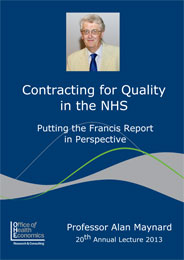Sign up to our newsletter Subscribe
Analysing Global Immunisation Expenditure

Sign up to our newsletter Subscribe


The key to effective and lasting quality improvement is better, not more, regulation. Professor Alan Maynard, University of York, delivered the 20th OHE Annual Lecture five months after release of the Francis Report, a public inquiry into serious failures in…

The key to effective and lasting quality improvement is better, not more, regulation.
Professor Alan Maynard, University of York, delivered the 20th OHE Annual Lecture five months after release of the Francis Report, a public inquiry into serious failures in patient care at the Mid Staffordshire NHS Foundation Trust.
OHE’s Annual Lecture, given by Professor Alan Maynard in July 2013, is now available as a publication and can be downloaded from this website.
Professor Alan Maynard, University of York, delivered the 20th OHE Annual Lecture five months after release of the Francis Report, a public inquiry into serious failures in patient care at the Mid Staffordshire NHS Foundation Trust. This three-volume, 1,794-page report made 290 recommendations for more regulation. "Sadly", Professor Maynard notes, "[Francis’s] proposals were not evidenced, not prioritised and not costed".
As with many earlier inquiries into alleged deficiencies in care in the NHS, the Francis Report’s remedies emphasise additional regulation, an approach with which Professor Maynard disagrees. UK responses to perceived problems in health care quality, he notes, have produced continuous structural “re-disorganisation” over the past 40 years. These rarely have been evidence based; the disruptions created often were more profound than any improvement.
The alternative to "more regulation (as advocated by lawyers and public inquiries) is better regulation", according to Professor Maynard. Better regulation, in turn, is based on evidence and economic analysis. Outcomes measurement is at the core of the economic approach to reforming health care proposed by Professor Maynard. Understanding outcomes, in turn, allows the adoption of effective incentives for change, both financial and non-financial.
A crucial issue is variation in clinical practice, long of concern in the UK and elsewhere, as Professor Maynard explains. "Contracting for quality and patient protection in the NHS, and all other health care systems", he concludes, "requires scepticism about medical practice and rigorous performance review of clinicians by clinicians. . . . Reputation should be the engine of quality improvement that is led by clinicians, rather than repetitive political reorganisations and increases in legalistic regulation".
Download Maynard, A., 2014. Contracting for quality in the NHS: putting the Francis Report in perspective. Annual lecture series. London: Office of Health Economics.
Professor Maynard’s slide presentation for the lecture also is available by clicking here.

An error has occurred, please try again later.
This website uses cookies so that we can provide you with the best user experience possible. Cookie information is stored in your browser and performs functions such as recognising you when you return to our website and helping our team to understand which sections of the website you find most interesting and useful.
Strictly Necessary Cookie should be enabled at all times so that we can save your preferences for cookie settings.
If you disable this cookie, we will not be able to save your preferences. This means that every time you visit this website you will need to enable or disable cookies again.
This website uses Google Analytics to collect anonymous information such as the number of visitors to the site, and the most popular pages.
Keeping this cookie enabled helps us to improve our website.
Please enable Strictly Necessary Cookies first so that we can save your preferences!